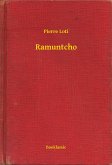Dans ce livre publié en 1917, Pierre Loti, le célèbre écrivain français de la grande époque et grand voyageur, décrit certains aspects de la Première Guerre mondiale. Si vous voulez vous sortir de l'image déformée de Loti, exotique et non juif, il vous suffit de lire ces textes qui donnent un éclairage différent et complètent la très bonne édition de «Soldats bleus».
Dieser Download kann aus rechtlichen Gründen nur mit Rechnungsadresse in A, B, BG, CY, CZ, D, DK, EW, E, FIN, F, GR, HR, H, IRL, I, LT, L, LR, M, NL, PL, P, R, S, SLO, SK ausgeliefert werden.









